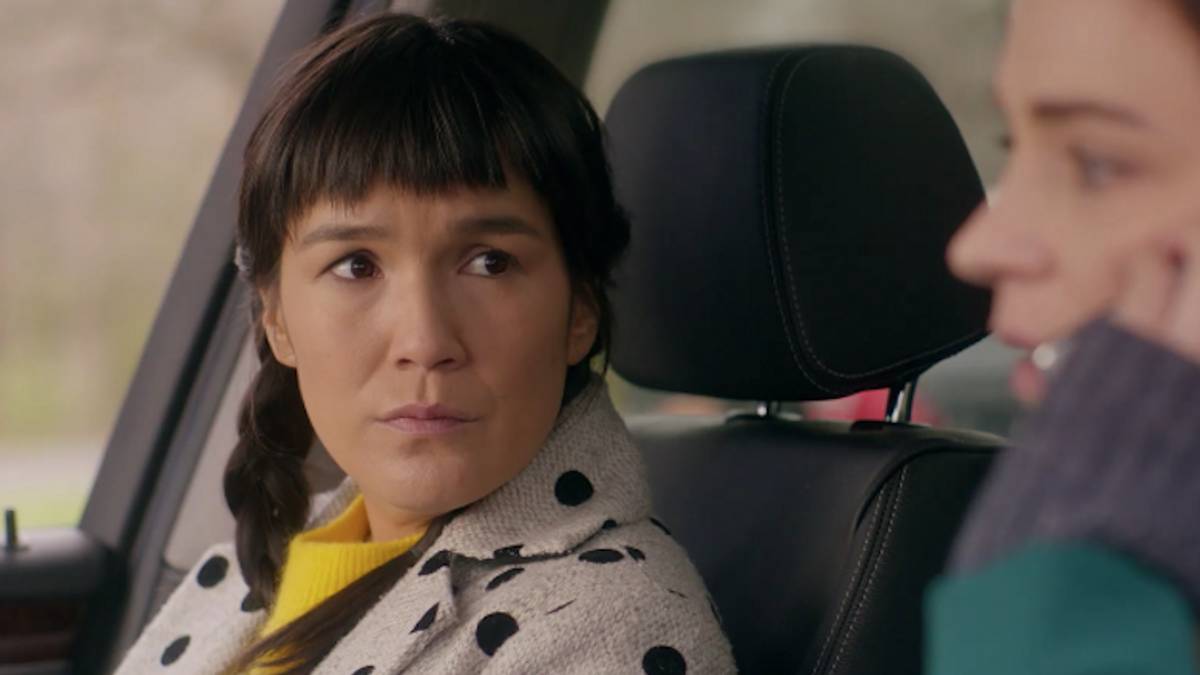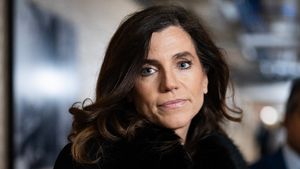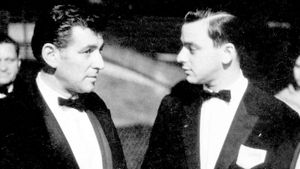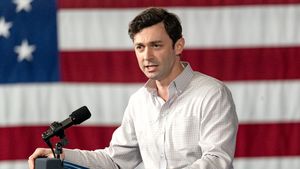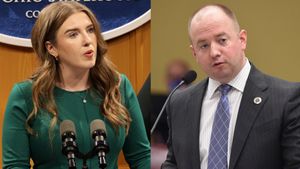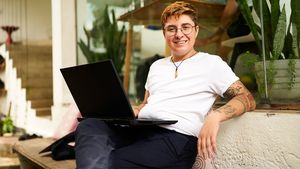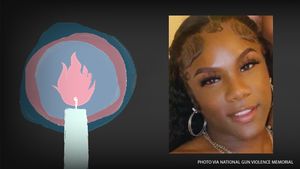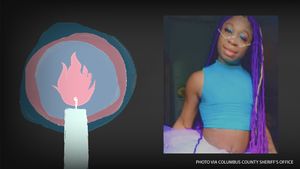Mia Lidofsky's female-driven, queer-centric comedy Strangers is currently in its second season on Facebook (watch the trailer here and full episodes here.) The show stars Zoe Chao as Isobel, who begins season 1 after her boyfriend has just moved out because she cheated on him with a woman. Each episode sees her renting out her spare room to a new tenant, until season 2, when she swaps coasts and moves to NYC, switching from host to renter.
After working for Girls' Jesse Peretz for two years, Lidofsky joined Beachside Films as a producer and development executive, during which time she conceived of her show. In 2015 she was selected for AFI's Directing Workshop for Women, and through the program directed the pilot episode of Strangers. The idea stemmed from Lidofsky's own experiences with AirBnB and the sharing economy. She recalls a story that happened when returning home to New York after months working in Louisiana, during which time she was renting out her studio in the West Village on Airbnb.
"I desperately wanted to return home to NYC, but my apartment was booked," she explains. "So I decided to rent an amazing loft in Williamsburg for the weekend, and experience the city through someone else's world via their home. When I went to return the keys, the host was like, 'I've got this funny story for you. I'm dating this girl, but she's based in LA. But it's not so bad because she's living right now in the West Village.' I said, 'Oh, I used to live in the West Village, I have an apartment there.' He said, 'Yeah, I know. My girlfriend is your sub-letter.'" She laughs. "I'd never met him, I'd never met his girlfriend, but we both had traded apartments for a weekend to afford living in the city that we loved. It was kind of early in the sharing economy... AirBnB was new on the scene. Uber had just started. And it was this moment where I thought, 'Our world is becoming more interconnected.' And that was the first percolation of the idea."
Related | Are you watching 'Strangers' Season 2?
From the get go, Lidofsky knew her show was tackling one central question: When does something become a home instead of just a place you're living? Her experiences living on two coasts had taught her the difficulties of constantly uprooting oneself, and how grounding it is to feel like you're at home.
After premiering the pilot at the AFI Showcase, Lidofsky shopped the series around to various different digital sites, and found a home with Refinery 29. The site agreed to fund the rest of season 1, and so Lidofsky and her team set out to shoot another 6 episodes the following summer. The series went on to premiere at Sundance, and was the U.S. Centerpiece at Outfest last summer. During that time, the series was acquired by Facebook's burgeoning television channel, and greenlit for a second season, meaning a much larger budget and potential audience. In the second iteration of the project, each episode expands from 15 minutes to a half hour, and, most notably, the show jumps to a new location: from Los Angeles to New York City, where Isobel's role shifts from host to renter.
That question--what makes something into a home--continues to take center stage as the show takes on the Big Apple.
"There has been something really freeing in making Season 2 because it mirrors a more mature stage of life than Season 1 did," Lidofsky muses. "I wrote the pilot of Strangers when I was single and looking for love, and dealing with the infinite heartbreaks of being a queer woman who attracts straight women. Since those four years have passed, I have fallen madly in love. I'm now engaged. I'm getting married in three months to my partner, the most incredible human I've ever met. And there has been this ability to evolve and I think a process of self love that's come with falling so in love and feeling so supported and protected. I've been able to channel and pour that life and love and complexity into the project, and in many ways found home along the way. To me, home is where Celia [Rowlson-Hall, Lidofsky's fiance and frequent Strangers collaborator] is" she explains. "A lot of people have show running partners and she's been in many ways my behind the scenes partner in all of this and also has always given me the space to make sure the show is my voice. I genuinely don't know how I would have gotten through this season without her creative generosity and loving support."
Related | TV's Power to Change Lives
Finding fulfillment in love and friendship, specifically female relationships, is evident not only in the show itself--which tells nuanced, authentic lesbian stories and depicts the great variety of ways queer companionship can be manifested--but in the very way the show was created. Lidofsky wrote the script with her star, Chao, in mind--they've been best friends since the first day of nursery school. "I was crying and hiding behind my mom's leg, I didn't want to go in the door. Then this sweet, beautiful three-year old came up to me, and was like, 'It's okay. I'll be your friend.' That was Zoe Chao, and she has held her word for the last 29 years."
The show's emphasis on female friendship centers around the comaraderie of Isobel and Cam, played by Search Party's breakout comedic genius Meredith Hagner. "I really wanted to tell a story about a strong female friendship and about the women that pick you up when you're down, those friends who are your rocks," Lidofsky says. "It's all love and it doesn't mean it's not messy and it doesn't mean it's not complicated, but it's those friendships that get you through life and I wanted to depict this truly positive female friendship in it's most positive light."
The significance of the visibility of a full-length series about queer women on a major streaming platform is not lost on Lidofsky:
"I'm an out and proud lesbian and have been for over 12 years, and I think, as a queer person in this culture, I'm so starved for good queer content. Call Me By Your Name was my favorite movie of this last year and one of my favorite movies of all-time, and I thought it was so beautiful and rich and nuanced and showed this exciting, adventurous love."
More specifically, Lidofsky wanted to create a series about queer women that had a universality to it, with a focus on transitioning from a certain chapter of your life to another. Having the main character be bisexual was important because "there's traditionally been so much bi-phobia in both the heterosexual and homosexual communities," she explains. "I really wanted to show bisexuality in a real, true state. There is a huge contingency of our population that lives in this bisexual landscape, and they have the capability to love both men and women and there is a fluidity to that love."
Her work, like so many other queer artists in television today, such as the teams on Pose and Transparent, hopes to shake the societal understanding of what's 'normal': "Why does heterosexual, cis white have to be the standard? It's only the standard if we continue to make it the standard."
While the future isn't yet certain for Strangers, one can only imagine what might be next, after spending a season each in America's two largest cities. Directing is definitely Lidofsky's passion and what she intends pursue and hone through the next phases of her career. Ultimately, she wants to keep telling her own stories, authentically.
"I think I will always want to push the queer agenda," she declares. "There are so many straight stories that have been told in our life that it's just not of that much interest to me... I think there are these niches of, like, 'that's the gay show' or 'that's the show for young black women.' There's this idea of categorization, that there aren't enough seats at the table.
There needs to be more shows for more voices by more voices, and, I think, by more authentic voices. I have a hard time when there are these lesbian stories told by straight white men. They can be wonderful, brilliant, beautiful artists, but we don't need your version of that story. It's not your story to tell."
